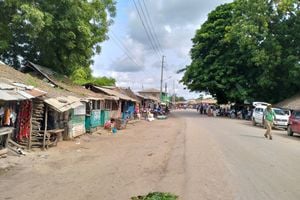
A title deed.
During President Daniel arap Moi’s reign, it was normal for the Head of State to allocate land to himself and his cronies. It did not matter whether such parcels were set aside for public utilities or for civil servants.
One such man was Kenny Mohammed Sheikh Ali, who applied to be allocated a parcel of land by then commissioner of lands Mr Wilson Gachanja on September 14, 1994. His reason for seeking to be allocated the land was that he had done a lot for the then ruling party Kanu yet he had not gotten "the fruits of ‘Uhuru’".
The letter was circulated to a number of officers, among them the acting District Commissioner, Kilifi District (now Kilifi County) who endorsed it and stated that there were two customs houses on a plot in Mtwapa Creek, which were not in use.
The land belonged to the Kenya Revenue Authority (KRA) and comprised a customs house and a watchtower erected to guard against smugglers. The taxman also intended to erect staff houses on an empty space. But it was given to Mr Ali, who has since died as a gift for his support for the then ruling party.
The businessman later sold the land to Francis Gathui Wahome, a former KRA employee, who transferred it to Frann Investment Limited, a company where he and his wife Ann Gathoni and his three sons are directors. Wahome was employed by the East African Customs & Excise Department as a preventive officer in 1964. He purchased it from Ali for Sh403,000 and developed 10 flats in one of the plots. He maintained that he was an innocent purchaser.
Frann Investment Ltd lost the land and the developments on it in November 2020 when Justice Sila Munyao of the Environment and Land Court ruled that the acquisition of the land by Ali and later selling it to Wahome was irregular.
Not satisfied with the decision, Wahome, through his company, moved to the Court of Appeal, but suffered the same fate when three judges upheld the decision and ruled that the land was not available for allocation. Justices Pauline Nyamweya, Dr Imaana Laibuta and George Odunga ruled that the procedure required, for the allocation of the property to Ali was not followed.
In addition, the judges said Section 10 of the Government Land Act required leases with respect to town plots may be granted for any term not exceeding one hundred years, and section 12 specifically required the said leases, unless the President otherwise ordered in any particular cases, to be sold by auction.
"No evidence of such procedure was adduced by the Appellant (Frann Investment Ltd), who was the one alleging that the suit property was available for alienation and therefore bore the burden of proving that this was the fact. No evidence was also brought of any lease issued to Kenny Mohammed Sheikh Ali that was capable of being transferred to the 2nd Respondent (Wahome) and thereafter to the Appellant," the judges said.
The judges said the transfer of the property to Frann Investment Ltd was not made in good faith, as it was meant to cloud the fraudulent and illegal acquisition of the property by Mr Wahome. In his judgment in 2020, the judge said the land in Mtwapa Creek had been set aside for customs house and there is no indication that KRA was approached so that they may say that they no longer need the land and affirm that it can be allocated to a private individual.
"My view is that so long as land had, or has been, set aside by the government for specific use, which use is apparent from the pertinent records, including survey plans and/or PDPs, or visible on the ground, then that land must be considered to be part of ‘alienated Government land’," Justice Munyao said.
While seeking for the cancellation of the title, Ethics and Anti-Corruption Commission (EACC) said as a preventive officer at KRA, Wahome must have known that the land was not available for alienation as it comprised a customs house and a watchtower erected to guard against smugglers.
The commission said the original property was reserved, planned and used, as a customs outpost or watchtower and guard house, of the then Department of Customs. Through Ben Murei, EAC said the whole process of alienation of the original property, the renumbering of the property, and the grant to Frann Investment was tainted with fraud and against the express provisions of the law.
The Court of Appeal judges said they had no hesitation in finding that, having been planned and reserved for use by the customs department, and this being a public purpose, the property was not unalienated land and was therefore not available for alienation.
"We also find that, even if the suit property was thereafter available for allocation as unalienated Government land as urged by the Appellant, there was a specific and mandatory procedure required to be followed under section 9 of the repealed Government Land Act, which required the Commissioner of Lands "to cause any portion of a township which is not required for public purposes to be divided into plots suitable for the erection of buildings for business or residential purposes, and such plots may from time to time be disposed of in the prescribed manner"," the judges said.
The judges borrowed from a judgment of the Supreme Court made in December 2023, cancelling the allocation of a beach plot, which was allocated to President Moi in November 1989. The land is adjacent to the Indian Ocean.
In 1995, Moi transferred the land to Bawazir & Co. (1993) Ltd and who later sold it to Dina Management Limited in October 2006 for Sh18 million. Dina then developed the property and constructed a perimeter wall. The apex court ordered the land returned to the public stating that despite changing hands several times and the passage of time does not stop it reverting to the public. The Supreme Court decision also raised the bar on the level of due diligence required from the buyers.
A bench of five judges presided by Deputy Chief Justice Philomena Mwilu ruled that having been irregularly obtained by Moi, the former President, now deceased, could not pass any valid title deed to any subsequent buyer and that all other successions that followed were illegal. In the case, Dina Management Limited moved to the Supreme Court after the High Court and the Court of Appeal ordered the cancellation of its title and the land reverted to the Mombasa county government.
The court having been designated as an open space, it was rendered a public utility and could not be described as unalienated public land and, therefore, not available for alienation to President Moi or for further alienation. A similar case played out in the allocation of several parcels in Eldoret town, which had been allocated to Lima Ltd, a firm associated with Moi and former powerful minister Nicholas Biwott. The land, where the Eldoret Fire Station, the Administration Police camp as well as the High Court stands, has since been recovered by EACC.
The four parcels of land were allocated to Lima limited between 1995 and 1998.
Documents filed in court state that in a meeting of the Board of Survey for government offices and houses held in the DC’s office on September 7, 1995 and another held on January 11, 1996, all government and municipal Houses sitting on the land were 'boarded' paving way for allocation.
The Commission stated that houses were boarded not because they were old and incapable of repair but because they were sitting on prime land and needed to pave the way for commercial development by private entities.
EACC raised concerns in the manner in which the boarding was dealt with because the commission said it was done in total disregard of public interest. "If the buildings were old, why not repair or rebuild them?" EACC had asked. The title deeds were later cancelled by Justice Anthony Ombwayo.







